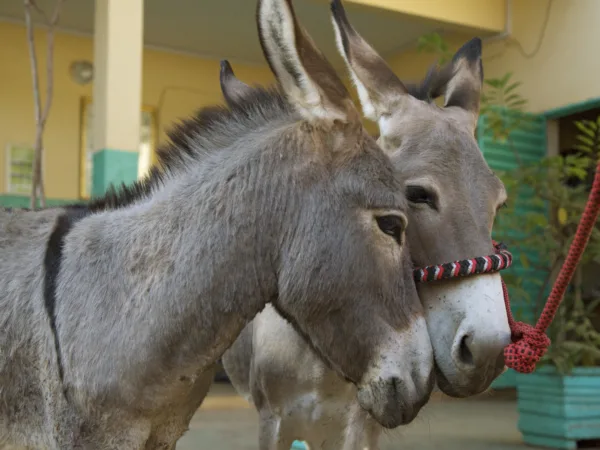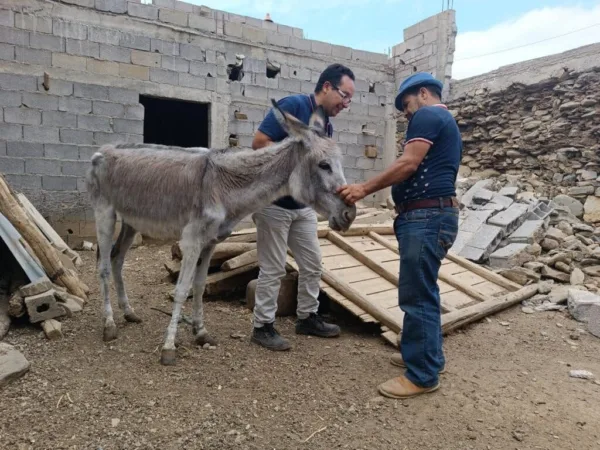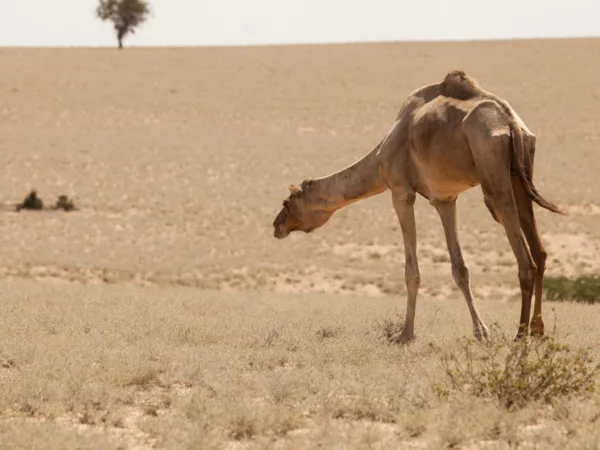UN RECOGNISES VITAL ROLE OF WORKING ANIMALS IN DISASTER RELIEF
18 December 2024: The United Nations adopted a resolution on 26 November formally acknowledging the vital role of working animals in disaster risk reduction, following years of advocacy from animal welfare organisations.
Working animals, including horses, donkeys and mules, offer a lifeline in times of disaster – providing vital support in the immediate aftermath and rebuilding lives by transporting resources, evacuating people and accessing disaster zones where vehicles cannot.
The International Coalition of Working Equids (ICWE), made up of Brooke, The Donkey Sanctuary, SPANA, and World Horse Welfare successfully advocated for the inclusion of working animals into the resolution in line with there presence in the Sendai Framework for Disaster Risk Reduction for almost ten years.
This marks an important milestone and paves the way for further advocacy to ensure working animals are considered by member states in their disaster resilience planning.
ICWE has long campaigned for recognition of the contribution working animals make to community disaster resilience and the need to protect them in disaster risk management plans.
Jessica Stark, Chair of ICWE and Director of Communications and Public Affairs at World Horse Welfare, said:
“We are delighted that working animals are finally recognised for the vital support they provide to communities around the world during times of disaster. As a coalition of the world’s leading working animal welfare organisations, with a collective presence in almost 50 countries, ICWE is advocating for the millions of working equids around the world to be better protected when disasters strike, for instance by evacuating them to safety and giving them essential food, water and veterinary care. Our combined work and influence spans many countries around the world, where these animals are essential to communities facing some of the most challenging disasters – such as floods, droughts, earthquakes, hurricanes and volcanic eruptions.”
Anna Marry, Senior Global External Affairs Advisor at Brooke said:
“Across Asia, Africa and Latin America where we work, we see every day how some of the poorest communities are ravaged by climate disasters. Their working animals are often all they have. We are proud to have been able to take their voices to the corridors of power at the United Nations and advocate for the protection of their animals – the most vital resilience assets in the face of climate change.”
Ian Cawsey, Director of Advocacy and Campaigns at The Donkey Sanctuary, said:
“The United Nations’ recognition of working animals in disaster risk reduction opens the door for us to engage member states and bring the resolution to life in country level policy and plans. This decision comes after years of combined influence, and gives us leverage to ensure greater protection for millions of working donkeys and other animals around the world.”
Linda Edwards, Chief Executive at SPANA, said:
“In the aftermath of a disaster, working animals can play a critical and often life-saving role. I personally witnessed donkeys and mules delivering essential aid following the Morocco earthquake which struck in 2023, reaching isolated communities that might otherwise have not received support.
“These extraordinary animals are invaluable assets to their communities, yet their contributions during humanitarian responses are often disregarded, and they are typically the last to receive assistance. Working animals are sentient beings, deserving of lives free from pain and suffering. The inclusion of working animals in the UN resolution is a monumental step toward a future where every working animal is not only recognised, but valued and respected.”
Working animals make a vital contribution to low- and middle-income countries, and by doing so play a key role in achieving the United Nations’ Sustainable Development Goals. In July 2024, ICWE advocated for the inclusion of working animals in the Sustainable Development Goals framework at the High-Level Political Forum in New York, and in a joint official side event to explore the vital role of working animals in climate resilience and adaptation.
Read the UN’s full resolution here: Portal to the work of intergovernmental bodies.
More information
About the International Coalition for Working Equids
The International Coalition for Working Equids is comprised of leading working animal NGOs Brooke, The Donkey Sanctuary, SPANA and World Horse Welfare and was established to work with the World Organisation for Animal Health (WOAH) and its members to implement the OIE Terrestrial Code Chapter 7.12 on the Welfare of Working Equids.
- Brooke is an international charity that protects and improves the lives of the working horses, donkeys and mules that give people in the developing world the opportunity to work their way out of poverty. Over 100 million of these animals are currently working worldwide. Sadly, many working horses, donkeys and mules are suffering, so Brooke works in more than 11 developing countries, with owners, communities, service providers, governments and international organisations to make long lasting improvements to the lives of animals and their owners.
- The Donkey Sanctuary, founded in 1969, has grown from a charity rescuing UK donkeys from neglect to an international animal welfare organisation transforming the lives of millions of donkeys and mules, and people depending on them for their livelihood. The charity’s vision is a world where donkeys live free from suffering, and their contribution to humanity is fully valued. The Donkey Sanctuary runs 10 sanctuaries in the UK and Europe, giving lifelong care to over 6,000 donkeys and mules; it also works in almost 40 countries for animals in agriculture, industry and transportation, as well as those used in meat and skin production.
- SPANA (the Society for the Protection of Animals Abroad) has been the charity for the working animals of the world since 1923, transforming the lives of horses, donkeys, mules, elephants and camels in need. The charity improves the welfare of working animals by ensuring the treatment and care of animals, the training of animal owners and the teaching of children about animal welfare.
- World Horse Welfare is an international charity that protects equine welfare by improving the horse-human relationship using a combination of hands-in care, research, education and influence. Our international programmes work with communities in Africa, Europe, Latin America and Asia to share knowledge and skills so helping owners improve their own lives and those of the equids they rely upon.



